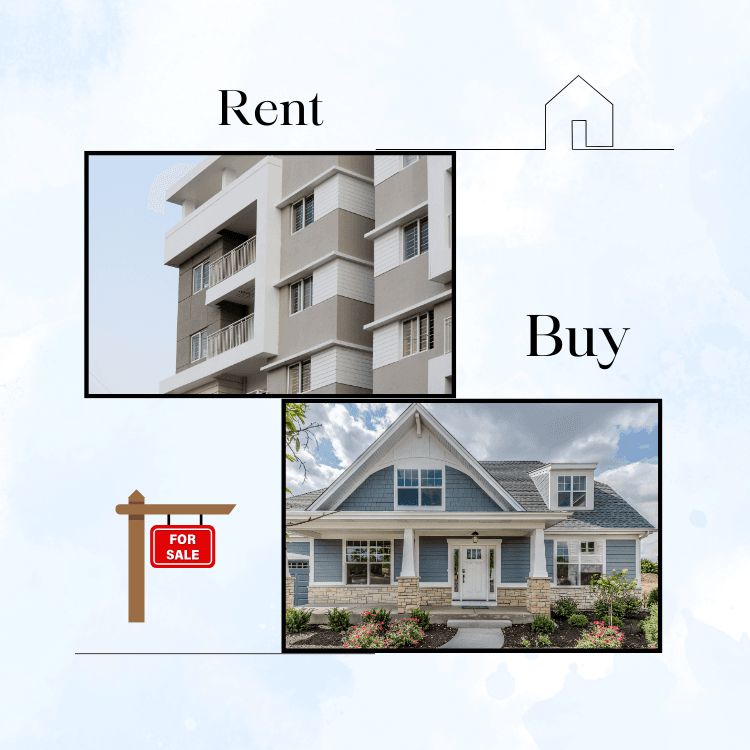The decision to rent or buy a home is one of the most significant financial choices you’ll make. Both options have their advantages and drawbacks, and the right choice depends on your personal circumstances, financial situation, and long-term goals. In this article, we’ll explore the pros and cons of renting versus buying to help you determine which option is best for you.
The Case for Renting
Renting offers flexibility and less financial commitment, making it an attractive option for many people, especially those who are not ready to settle down or are uncertain about their long-term plans.
Pros of Renting:
- Flexibility and Mobility
- Renting provides the freedom to move more easily, whether it’s for a job, family, or personal reasons. Lease agreements typically last for a year, so you’re not tied down to one location for the long term.
- Lower Upfront Costs
- Renting usually requires a security deposit and possibly the first and last month’s rent, but these costs are significantly lower than a down payment for purchasing a home. This makes renting more accessible, especially for those with limited savings.
- No Maintenance Responsibilities
- As a renter, you’re not responsible for home repairs or maintenance. If the dishwasher breaks or the roof leaks, it’s the landlord’s responsibility to fix it, which saves you both time and money.
- Predictable Monthly Expenses
- Renters typically pay a fixed amount each month, which makes budgeting easier. There are no surprise costs like property taxes, homeowners insurance, or unexpected repairs to worry about.
- Access to Amenities
- Many rental properties, especially apartments, offer amenities like pools, gyms, and security services that might be expensive to maintain in a home you own.
Cons of Renting:
- No Equity Building
- Rent payments don’t contribute to building equity. You’re essentially paying for someone else’s mortgage without the benefit of owning the property yourself.
- Rent Increases
- Rent can increase annually, sometimes significantly, depending on the market and your landlord’s policies. This can make long-term financial planning more challenging.
- Limited Control Over the Property
- As a renter, you have limited control over the property. You might not be able to make changes or improvements, and you’re subject to the landlord’s rules and decisions.
- No Tax Benefits
- Homeowners often enjoy tax benefits such as mortgage interest deductions, but renters don’t have these opportunities to reduce their tax liability.
The Case for Buying
Buying a home is a significant investment that can offer long-term financial rewards and a sense of stability. It’s often seen as a crucial step toward building wealth and establishing roots in a community.
Pros of Buying:
- Building Equity
- With each mortgage payment, you build equity in your home. Over time, this can lead to significant wealth accumulation, especially if property values increase.
- Stable Monthly Payments
- If you choose a fixed-rate mortgage, your monthly payments will remain consistent, making it easier to plan your finances. This stability contrasts with the potential unpredictability of rising rent.
- Freedom to Customize
- Homeownership gives you the freedom to renovate, decorate, and modify your property as you see fit. This allows you to create a space that truly reflects your style and needs.
- Potential for Appreciation
- Real estate can be a valuable investment. Over time, property values tend to increase, which can result in a significant return on investment if you decide to sell.
- Tax Benefits
- Homeowners can take advantage of tax deductions on mortgage interest, property taxes, and sometimes even energy-efficient home improvements. These tax benefits can make homeownership more affordable.
- Sense of Stability and Community
- Owning a home often leads to a stronger sense of belonging to a community. You’re more likely to put down roots, build relationships with neighbors, and invest in your local area.
Cons of Buying:
- Higher Upfront Costs
- Buying a home requires a substantial upfront investment, including a down payment, closing costs, and moving expenses. These costs can be a barrier for many prospective buyers.
- Maintenance and Repair Responsibilities
- As a homeowner, you’re responsible for all maintenance and repairs. This can be costly and time-consuming, especially if unexpected issues arise.
- Less Flexibility
- Selling a home can be a lengthy and complex process. If you need to move quickly for a job or personal reasons, you might face challenges in selling your home or might have to rent it out.
- Market Risks
- The real estate market can be unpredictable. If property values decline, you could end up owing more on your mortgage than your home is worth, making it difficult to sell or refinance.
- Ongoing Costs
- Homeownership comes with ongoing costs beyond the mortgage, such as property taxes, homeowners insurance, and sometimes HOA fees. These costs can add up over time.
Factors to Consider
When deciding whether to rent or buy, consider the following factors:
- Financial Readiness
- Do you have enough savings for a down payment and closing costs? Are you financially stable enough to handle ongoing homeownership costs?
- Long-Term Plans
- How long do you plan to stay in one place? If you’re planning to move within a few years, renting might be more practical.
- Market Conditions
- Are home prices rising or falling in your area? Is it a buyer’s or renter’s market? Understanding local market conditions can help guide your decision.
- Personal Lifestyle
- Do you value flexibility and the ability to move frequently, or are you looking to settle down and invest in a long-term home?
- Job Stability
- Is your job secure, and do you expect your income to remain stable or increase? Job stability is crucial for handling the long-term financial commitment of a mortgage.





